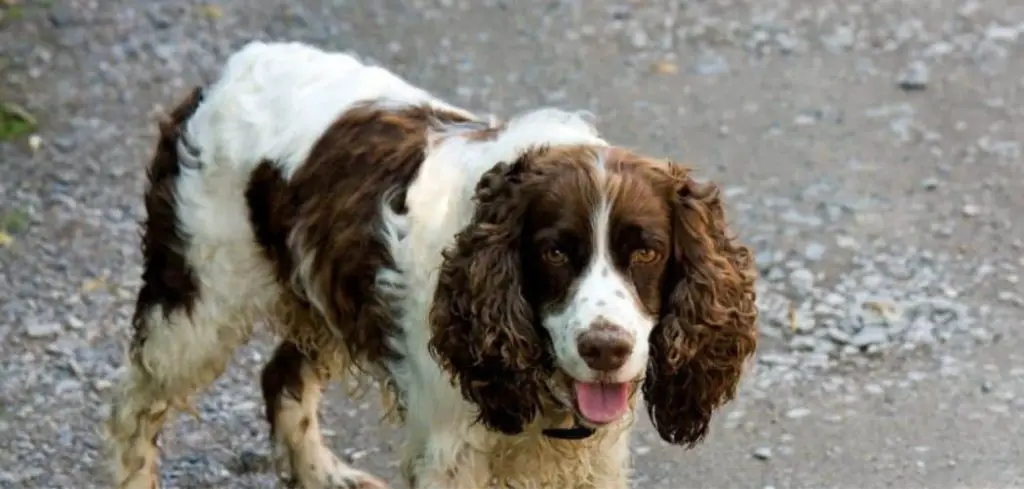Dogs that are panting heavily and also experiencing diarrhea may be going through a range of physical or emotional distress.
While panting is a normal cooling mechanism, excessive panting coupled with gastrointestinal upset can signal a deeper problem.
We outline the common causes of heavy panting and diarrhea in dogs, what you can do at home, and when to seek veterinary help.
Table of Contents
Dog Panting Heavily and Diarrhea — Why It Happens
When a dog is both panting heavily and has diarrhea, it often indicates systemic stress or illness. This can be triggered by anxiety, heatstroke, infections, or internal organ problems. In some cases, poisoning or reactions to medications can also lead to these signs.
Both symptoms together suggest your dog is not just uncomfortable but may be facing a condition that needs urgent evaluation.

Common Causes of Dog Panting Heavily and Diarrhea
Heatstroke
Heatstroke occurs when a dog’s body overheats and can’t regulate its temperature. This often happens in hot weather or after too much exercise without access to shade or water.
Heavy panting is the body’s attempt to cool down, while diarrhea can result from dehydration or gastrointestinal distress caused by heat.
Dogs may also drool, collapse, or have red gums. It’s a medical emergency that can turn fatal quickly.
Read more: Dog Panting Excessively (Here’s why)
Stress or Anxiety
Stressful events—like fireworks, car rides, or changes in routine—can cause your dog to pant and experience digestive upset.
Panting acts as a physical release of nervous energy, while the gut may react to anxiety with loose stools or diarrhea.
While less dangerous than physical illness, chronic stress needs to be addressed with calming strategies or behavioral help.
Infections (Bacterial or Viral)
Gastrointestinal infections like parvovirus, salmonella, or campylobacter can cause diarrhea and leave your dog weak and panting.
Panting may result from fever, abdominal pain, or systemic illness.
These conditions often include vomiting, lethargy, and refusal to eat—requiring prompt veterinary care.
Ingestion of Toxins or Spoiled Food
If your dog ate something toxic—like chocolate, garbage, certain plants, or human medications—they may react with both panting and diarrhea.
Toxins irritate the gastrointestinal tract and can impact the heart, liver, or nervous system, leading to labored breathing or distress.
This is an emergency. Bring a sample of the substance or packaging if available to the vet.
Pancreatitis
Inflammation of the pancreas causes abdominal pain, vomiting, diarrhea, and heavy panting due to pain and discomfort.
It often follows eating fatty foods and can range from mild to life-threatening.
Dogs may adopt a prayer position (front legs extended, back end raised) or seem unable to rest comfortably.
Medication Side Effects
Some medications like NSAIDs, steroids, or antibiotics can cause diarrhea and also stimulate panting.
Panting might be a side effect of drug-induced discomfort or restlessness.
If you notice a pattern after administering medication, consult your vet about possible alternatives.
What to Do If Your Dog Is Panting Heavily and Has Diarrhea
Start by offering fresh, cool water and keeping your dog in a shaded, quiet place.
Avoid feeding your dog for a few hours to let their stomach settle, then offer a bland diet like boiled chicken and rice in small portions.
Keep track of other symptoms like vomiting, bloating, lethargy, or signs of pain.
Ensure your dog isn’t exposed to heat, exertion, or stress until symptoms resolve.
If stress or anxiety is suspected, try calming aids like pheromone diffusers or speak to your vet about anti-anxiety options.
When to Call or Visit Your Vet
Contact your vet immediately if your dog:
Has diarrhea lasting more than 24 hours
Is panting excessively even while resting
Shows signs of dehydration (sunken eyes, dry gums, poor skin elasticity)
Is vomiting, lethargic, or won’t eat
Has blood in the stool or black/tarry diarrhea
Was exposed to heat, toxins, or unknown substances
These symptoms can indicate a serious underlying condition requiring diagnostics like blood tests, fecal analysis, or imaging.
Read more: Dog Panting Excessively in Heat (Here’s what’s going on)
Key Takeaway
Panting heavily and having diarrhea are not symptoms to ignore—especially when they occur together. They signal that your dog is experiencing significant physical or emotional distress.
While mild cases may resolve with rest, hydration, and bland food, persistent or severe symptoms require veterinary attention.
By acting early, you can prevent complications and help your dog recover quickly and safely.
